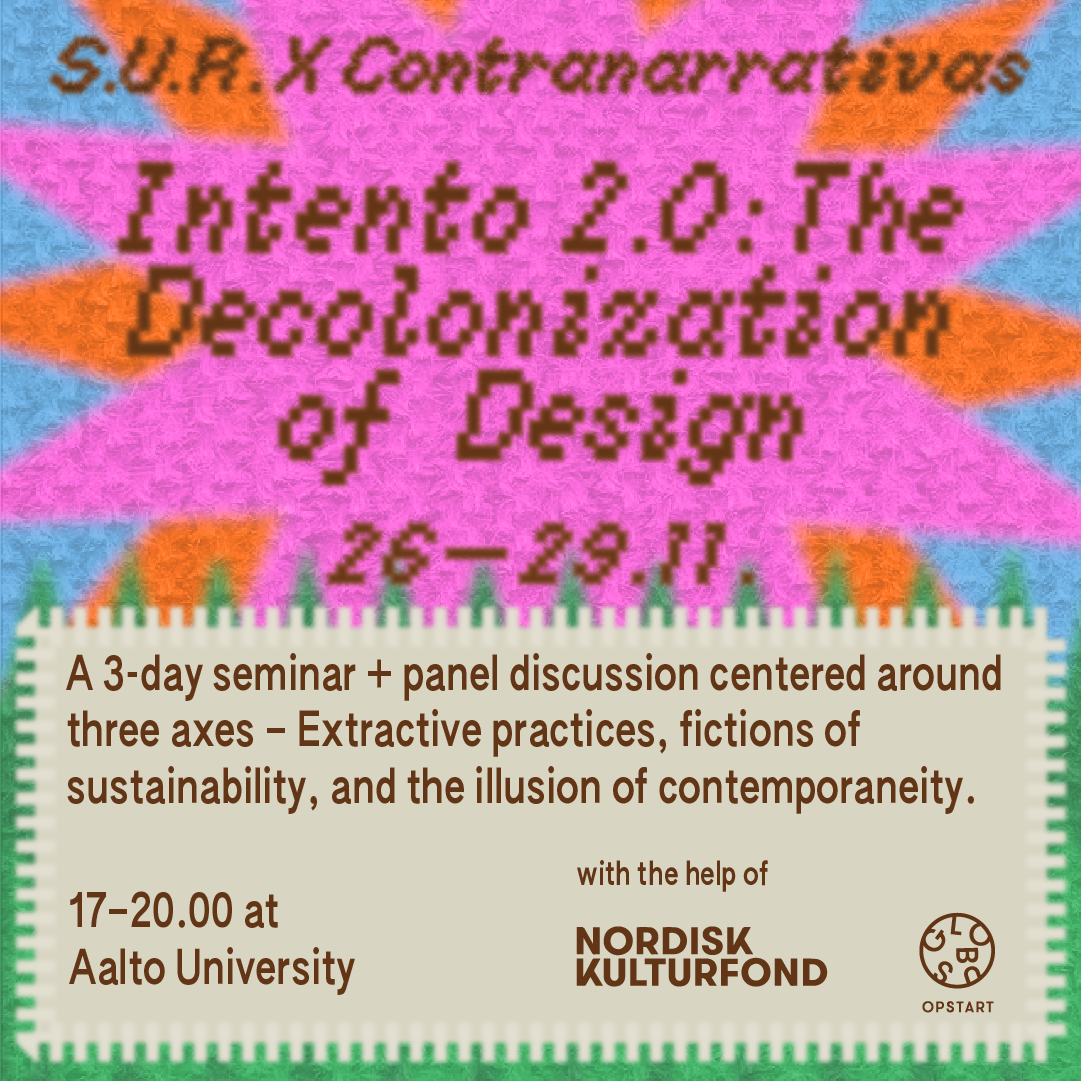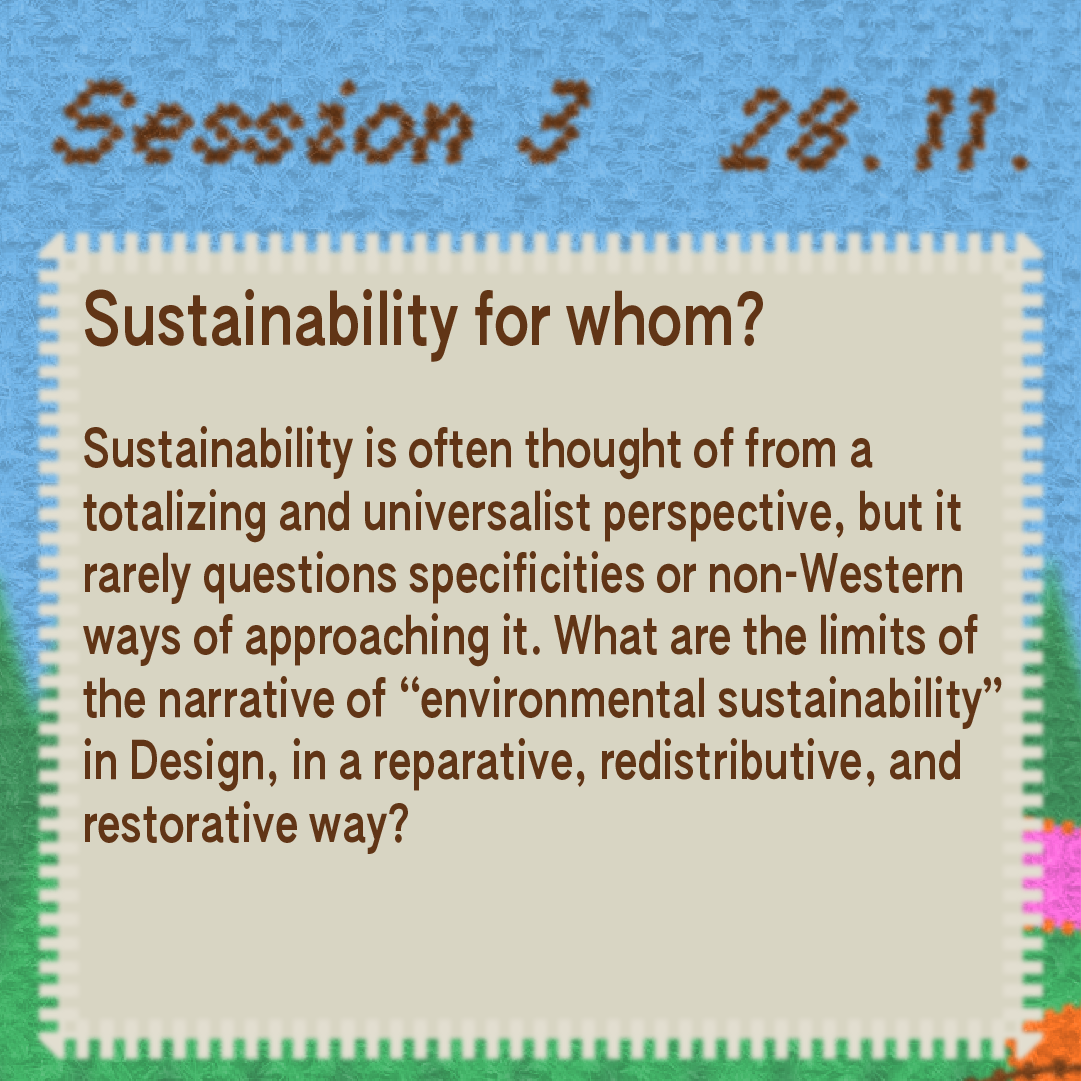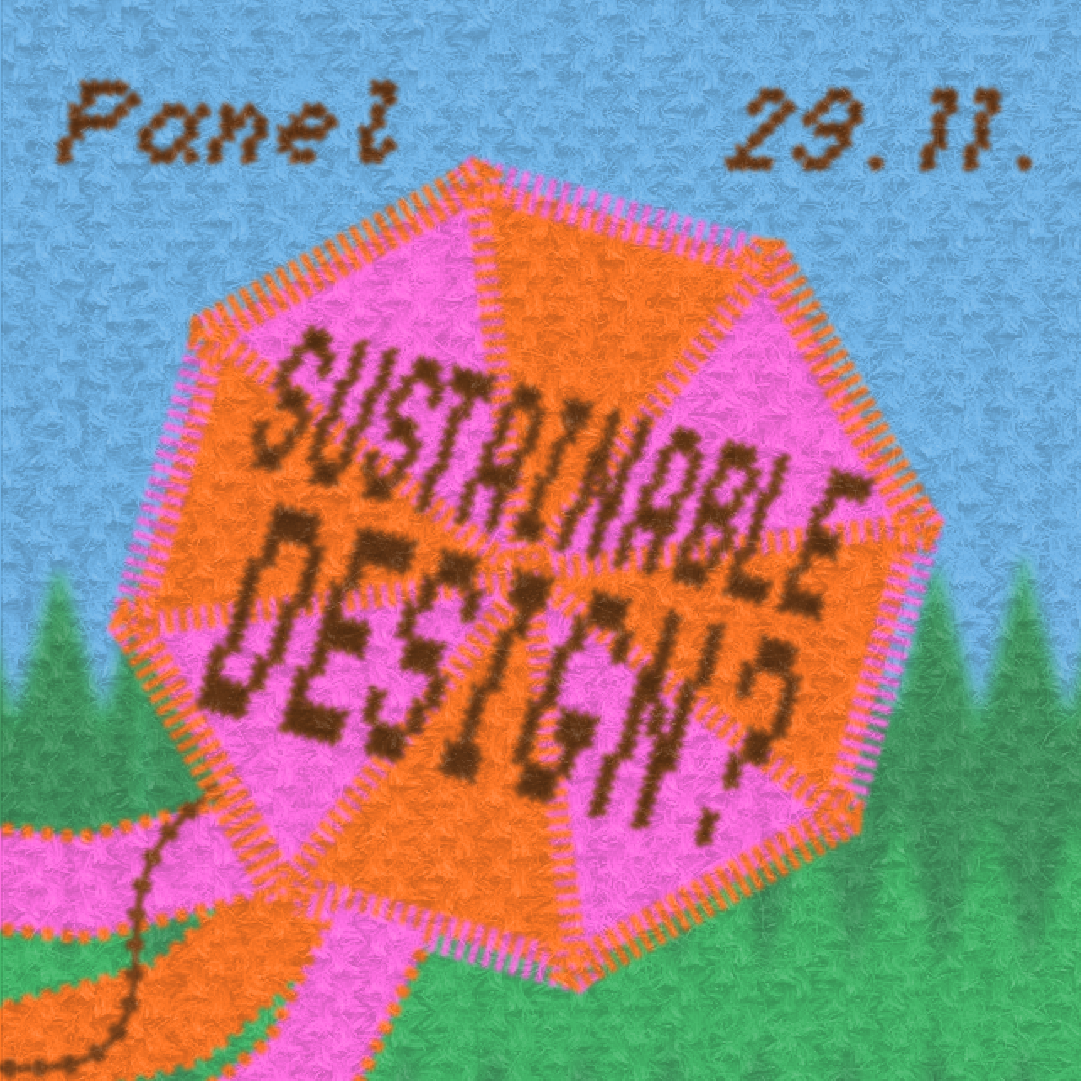
Intento 2.0: The Decolonization of Design
Hey amigxs! We are happy and excited to invite you all to Intento 2.0: The decolonization of Design.
This year, S.U.R is bringing Contranarrativas collective to host a 3-day seminar and a panel discussion that will revolve around imaginaries and reflections on how to think sustainability through Design in a critical, just, and caring way. Together, we will explore the possibility of developing an open, porous, inclusive, experimental and decolonized space of reflection for the co-construction of knowledge and existence, from a non-Western perspective.
✺ Seminar
The 3-day seminar will be centered around three axes – Extractive practices, fictions of sustainability, and the illusion of contemporaneity.





Session 1. Decolonization and decanonization of Design
Design is not neutral, innocent, ahistorical, or apolitical. It has historically been crossed by Western-centric canonical thought, the civilizational model of modernity, and the accumulation pattern of the neoliberal system that sustains the illusion of contemporaneity. Why is it relevant to question these notions, and how can we create counternarratives?
Session 2. This was designed on stolen land
There is no anticolonial or antiracist notion of environmental sustainability when it is based on the concept of natural resources, which does not confront the structural causes that produce climate emergency. How can we think of a sustainable Design perspective that does not legitimize the anthropocentric and extractivist paradigm central to the so-called development of the North?
Session 3. Sustainability for whom?
Sustainability is often thought of from a totalizing and universalist perspective, but it rarely questions specificities or non-Western ways of approaching it. What are the limits of the narrative of “environmental sustainability” in Design, in a reparative, redistributive, and restorative way?
✺✺
The seminar will be held in English.
26-28 November, 17-20
Aalto University
Registrations are now open clicking HERE. Each session is independent so you may come to as many as you want, but due to the nature of the seminar we have limited spots, so be sure to only register if you can participate :)
✺ Panel discussion: Decolonization of Design: fictions of sustainability?
Sustainability is often thought of from a totalizing and universalist notion, but it doesn’t address specificities or non-Western ways of approaching it.
A group of diverse guests will join us to talk about how these notions affect the ways we design, exploring together how to bring new perspectives and counternarratives to our field.
The panel discussion will be held in English.
29th of November
17-19 hs
Aalto University, Väre Building, Room F101
✺✺
Fabián Villegas is a writer, journalist, spoken word artist, scholar and researcher in South epistemologies, anticolonial thoughts and racial studies. He is also the co-founder of Contranarrativas, a collaborative project that seeks to create horizontal knowledge production spaces to stimulate the visibility, dissemination and production of epistemologies, decolonial narratives and peripheral aesthetics of the Global South.
Julia Valle Noronha is a designer-researcher-educator that understands fashion as a major force in driving change towards more responsible futures. Her research interest explores this potential especially from the perspectives of fashion design and wearing practices. Brazilian born and raised, Julia approaches the field from an outlook that praises diversity and holds being with the earth at its core.
Nils Ehrenberg is a postdoctoral researcher at the Aalto University Department of Design. Ehrenberg has worked with design research for 10 years in Sweden, Portugal, and Finland. Ehrenberg’s research has explored civic participation, smart home technologies and housing, as well as learning analytics and tools. In his research Ehrenberg reflects on how design and technology re-shape both our social relationships and our relationship to the world around us.
Manuel Díaz Tufinio is a Mexican industrial designer and researcher working on intersections between history, design and botany. He is currently studying a MA in Creative Sustainability at Aalto University. Manuel has worked as a designer and in R&D team at EWE Studio, txt.ure, Archivo Diseño y Arquitectura Museum, and as a lecturer at CENTRO University.
See you very soon!!
✺ Glossary - some concepts to start thinking Sustainability, by Fabián Villegas from Contranarrativas
Anthropocentrism: a philosophical theory in which the human being and his interests are conceived as the center of everything, so there is a subordination of the "other" (living beings, environment, etc.) to the needs and well-being of the human being.
Colonialism: the political and economic system by which a foreign State dominates and exploits another foreign State. That territory is called a colony. Generally, military force is used to which the invaded country cannot oppose and the colonizer, invader or conqueror imposes military, political, economic, social, cultural and religious control, normally by appointing people from the conquering country.
Contemporaneity: the quality of relating to the present time.
Decanonization: cultural and political operation that implies the dismantling of hegemonic structures and hierarchies of cultural, aesthetic and knowledge production, through the visibility and historical recovery of other experiences not centered in the Western genealogies.
Extractivism: a model of development and accumulation by dispossession based on the appropriation and overexploitation of natural resources. Historically developed in the global South and its ethnoterritorialities, to satisfy the demands of capitalist accumulation of the Global North.
Global South: the Global South is a geographical, geopolitical, historical and developmental concept that refers to various countries around the world that are sometimes described as “developing,” “less developed” or “underdeveloped”.
Globalectics: exercise of political and cultural imagination, justice of knowledge that implies a multilogue between local and global experiences, north and south positionalities, multiple genealogies of knowledge around a cultural and social phenomenon.
Sustainability: a model of habitability and development based on the management of resources to satisfy current needs, without putting the needs of the future at risk, in the face of ecological, distributive, environmental, socio-environmental and climatic risks.
Territorial Colonialism: political, economic, and extractive regime in which a State or national and transnational private interests control and exploit territories, ethnoterritorialities, and territories ancestrally inhabited by indigenous peoples.
Territory: fragment of the earth's surface or the part of the natural environment that makes up an ecosystem, a political-legal-administrative entity, a cultural ecosystem, or a social and comunal tissue.
With the support of
